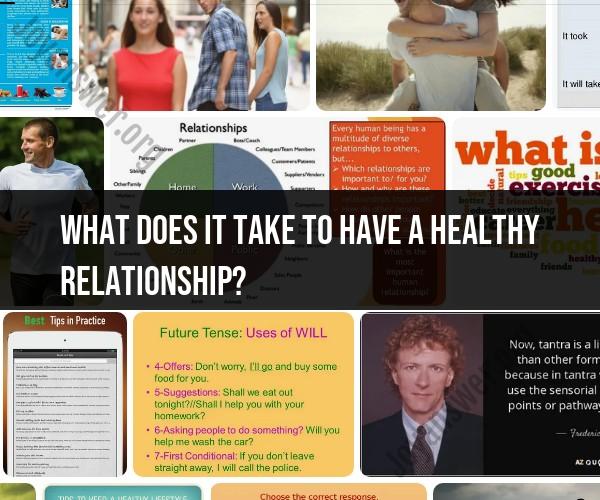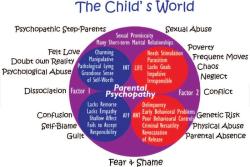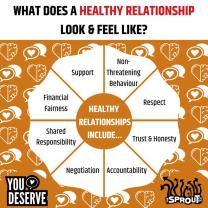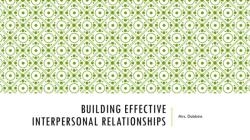What does it take to have a healthy relationship?
A healthy relationship is built on a foundation of mutual respect, trust, communication, and support. Here are some key ingredients that contribute to a healthy and thriving relationship:
Communication: Open and honest communication is fundamental. Both partners should feel comfortable sharing their thoughts, feelings, and concerns. Active listening is equally important; it shows that you value your partner's perspective.
Trust: Trust is the cornerstone of any healthy relationship. This means being reliable, keeping promises, and being honest with each other. Trust is easily broken but essential for building a strong bond.
Respect: Respect involves valuing each other's opinions, boundaries, and individuality. It means treating your partner with kindness and courtesy and not engaging in disrespectful behavior or language.
Quality Time: Spending quality time together helps deepen the connection. Whether it's date nights, shared hobbies, or simply talking and laughing together, these moments create memories and strengthen the bond.
Independence: While spending time together is essential, maintaining individual interests and independence is also crucial. Healthy relationships allow each partner to grow and pursue their own goals and interests.
Empathy: Empathy is the ability to understand and share your partner's feelings. It involves being supportive during challenging times and celebrating their successes.
Conflict Resolution Skills: Disagreements are normal in any relationship. Healthy couples have effective conflict resolution skills, which include staying calm, active listening, compromising, and finding solutions that work for both parties.
Physical Affection: Physical affection, like hugs, kisses, and holding hands, is a way to show love and affection. Physical intimacy is an important part of many relationships, but it should always be consensual and respectful.
Equality: A healthy relationship is based on equality. Both partners should have equal say and influence in the relationship's decisions and responsibilities. No one should dominate or control the other.
Support and Encouragement: Partners should support each other's goals, dreams, and ambitions. Encourage one another to reach their potential and be the best version of themselves.
Forgiveness: Mistakes happen, and forgiveness is crucial. Holding onto grudges can be toxic to a relationship. Forgiving your partner and moving forward is a sign of maturity and love.
Shared Values and Goals: While it's okay to have some differences, shared values and common goals can help you build a strong, cohesive partnership.
Intimacy: Emotional and physical intimacy are both important. Emotional intimacy involves being vulnerable with your partner and sharing your thoughts and feelings. Physical intimacy, when both partners are comfortable, can help strengthen the bond.
Boundaries: Set clear boundaries for the relationship. This includes personal space, alone time, and what you're comfortable with in terms of sharing and behavior.
Appreciation and Gratitude: Express your appreciation for your partner regularly. Small acts of kindness and expressions of gratitude can go a long way in maintaining a healthy relationship.
Patience and Understanding: Recognize that relationships have their ups and downs. Being patient and understanding during challenging times is essential.
Remember that no relationship is perfect, and conflicts and challenges are part of the journey. However, a healthy relationship is one where both partners are committed to working through these issues together, with love, respect, and understanding. If you find that your relationship is consistently marked by toxicity, abuse, or a lack of these key ingredients, seeking professional help or reevaluating the relationship may be necessary.
What are the essential components of a healthy relationship?
The essential components of a healthy relationship include:
- Communication: Effective communication is essential for any healthy relationship. Partners should be able to communicate openly and honestly with each other about their thoughts, feelings, and needs. They should also be able to listen to and understand each other's perspectives.
- Trust: Trust is another essential component of a healthy relationship. Partners should be able to trust each other to be honest, loyal, and supportive. They should also feel comfortable being vulnerable with each other.
- Respect: Mutual respect is essential for any healthy relationship. Partners should respect each other's opinions, feelings, and boundaries. They should also treat each other with kindness and consideration.
- Shared values and goals: Partners should share similar values and goals in order to build a strong and lasting relationship. They should also be willing to compromise and work together to achieve their shared goals.
How do effective communication and trust contribute to a healthy relationship?
Effective communication and trust are essential for a healthy relationship because they allow partners to build a strong connection with each other. When partners can communicate openly and honestly with each other, they feel better understood and supported. This can lead to greater intimacy and trust.
Trust is also essential for a healthy relationship because it allows partners to feel safe and secure. When partners trust each other, they know that they can rely on each other for support and that they can be honest with each other without fear of being judged or criticized.
What role does mutual respect play in maintaining a healthy relationship?
Mutual respect is essential for maintaining a healthy relationship because it shows that partners value each other's opinions, feelings, and boundaries. When partners respect each other, they are more likely to communicate effectively, trust each other, and work together to resolve conflicts.
Mutual respect also helps to create a positive and supportive environment for the relationship. When partners feel respected, they are more likely to feel happy and fulfilled in the relationship.
How can couples manage conflicts and challenges for a healthy relationship?
It is normal for couples to experience conflicts and challenges from time to time. However, the way that couples manage these conflicts can make a big difference in the health of the relationship.
Here are some tips for managing conflicts and challenges in a healthy relationship:
- Communicate effectively: When you are experiencing a conflict with your partner, it is important to communicate openly and honestly with them. Avoid using accusatory language or name-calling. Instead, focus on expressing your own feelings and needs.
- Listen to each other: It is also important to listen to and understand your partner's perspective. Try to see things from their point of view. This can help you to better understand the root of the conflict and find a solution that works for both of you.
- Be willing to compromise: In any healthy relationship, there will be times when you need to compromise. This doesn't mean that you have to give up on what is important to you, but it does mean that you need to be willing to meet your partner halfway.
- Seek professional help: If you are struggling to manage conflicts in your relationship, you may want to consider seeking professional help from a therapist or counselor. They can teach you communication and conflict resolution skills that can help you to build a stronger and more resilient relationship.
Are there common signs of an unhealthy relationship to watch for?
Here are some common signs of an unhealthy relationship:
- Lack of communication: If you and your partner are unable to communicate openly and honestly with each other, this could be a sign of an unhealthy relationship.
- Lack of trust: If you don't trust your partner or if they don't trust you, this could also be a sign of an unhealthy relationship.
- Lack of respect: If you and your partner don't respect each other's opinions, feelings, or boundaries, this is another sign of an unhealthy relationship.
- Control: If one partner is trying to control the other partner, this is a major red flag.
- Abuse: Any type of abuse, whether it is physical, emotional, or verbal, is a sign of an unhealthy relationship.
If you are experiencing any of these signs in your relationship, it is important to reach out for help. You can talk to a trusted friend or family member, or you can seek professional help from a therapist or counselor.
It is important to remember that you deserve to be in a healthy and fulfilling relationship. If you are not in a healthy relationship, there are steps you can take to improve the situation or to move on to a healthier relationship.












